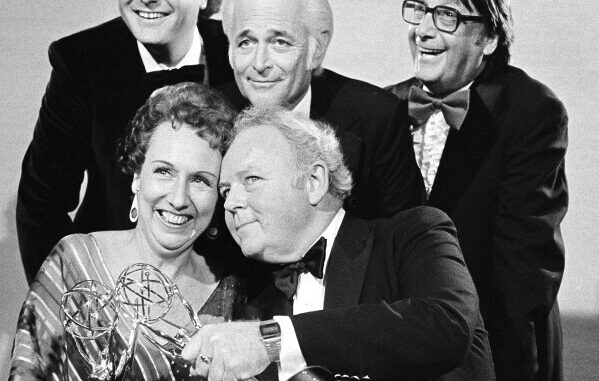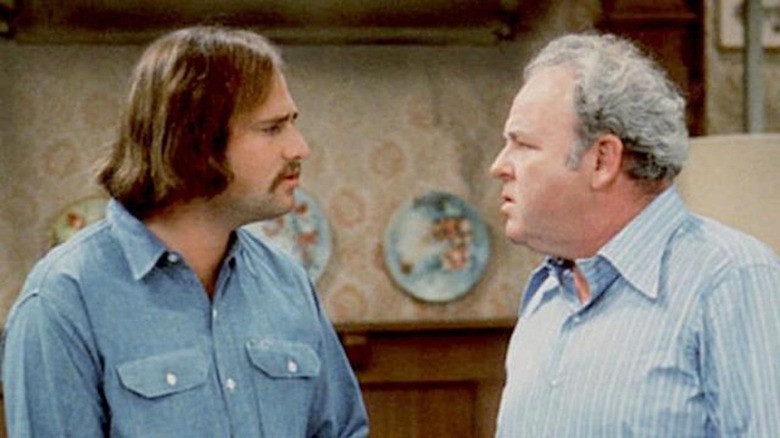
Look Back at the TV Show ‘All in the Family’
When All in the Family first aired in 1971, it was nothing short of revolutionary. At a time when TV sitcoms were largely filled with feel-good family dynamics and wholesome humor, this show completely upended the genre. With its unflinching approach to sensitive topics like racism, sexism, class struggles, and political division, All in the Family not only became a hit, but it also had a profound impact on television history.
As we look back at this groundbreaking show, it’s clear that its legacy endures. It broke taboos, challenged social norms, and laid the groundwork for the modern sitcom. So, what made All in the Family so special, and why does it still hold such a powerful place in TV history today? Let’s dive in.
A Bold Approach to Sensitive Topics
One of the defining characteristics of All in the Family was its willingness to tackle controversial issues that other TV shows wouldn’t touch with a ten-foot pole. From the very first episode, the show confronted topics like racism, anti-Semitism, women’s rights, and Vietnam War protests with humor and, at times, shocking frankness.
Archie Bunker: The Everyman Who Wasn’t Afraid to Say What He Thought
At the heart of All in the Family was Archie Bunker, played by Carroll O’Connor. Archie was a blue-collar, working-class man with outdated beliefs and a tendency toward bigotry. His politically incorrect remarks were often the source of both humor and discomfort, but they were also part of what made the show so powerful.
Archie represented a large portion of American society at the time—those who resisted the social changes of the 1960s and 1970s. By presenting Archie’s offensive views in the context of his family, All in the Family prompted viewers to laugh at his ignorance while also making them question the prejudices in their own lives. The show’s humor was sharp, but its underlying message was clear: bigotry, though often laughable, has real consequences, and it’s time to confront it.
The Unlikely Star: Edith Bunker’s Heartfelt Wisdom
While Archie was the loud-mouthed, often offensive patriarch, Edith Bunker (played by Jean Stapleton) was the heart and soul of the family. Edith was kind-hearted, gentle, and often the voice of reason, offering a perfect counterbalance to Archie’s brashness. But what made Edith truly stand out was her wisdom and emotional depth.
The Power of Empathy in a Divided Family
Despite her apparent naïveté, Edith was often the one who bridged the gap between Archie’s outdated views and the progressive ideals of their daughter, Gloria, and her husband, Mike. Edith was patient, loving, and non-judgmental, making her an ideal counterpart to Archie’s more harsh, black-and-white view of the world.
The dynamics between Edith and Archie highlighted the complexity of relationships and how love, respect, and understanding can help even the most divided of families come together. It’s this balance that made Edith one of TV’s most beloved characters, and her influence was undeniable in shaping the tone and impact of All in the Family.
The Groundbreaking Role of Gloria and Mike
Gloria, Archie’s daughter, played by Sally Struthers, and her husband Mike “Meathead,” played by Rob Reiner, represented the younger, more progressive generation. They were the antithesis to Archie’s old-fashioned mindset, and their often heated arguments with him formed some of the show’s most memorable moments.
Generational Conflict and Changing Social Norms
Gloria was the product of the feminist movement, having gone to college and held more progressive views on gender roles and women’s rights. Meanwhile, Mike was a university student whose liberal ideals often clashed with Archie’s conservative perspective. The generational divide in All in the Family mirrored the real cultural tensions in America at the time. The show was one of the first to depict the frustrations between the older generation’s resistance to change and the younger generation’s desire for progress.
These conflicts, often portrayed in a humorous light, made All in the Family much more than just a sitcom—it was a social commentary on the deep divisions within American society during the 1960s and 1970s. And while many of the issues explored on the show were politically charged, they still resonate with audiences today.
Impact on TV Comedy and Pop Culture
Before All in the Family, TV sitcoms rarely addressed social issues head-on. The standard family sitcoms of the time, like Leave It to Beaver and The Brady Bunch, focused on simple, wholesome narratives that avoided controversial topics. All in the Family, on the other hand, made these issues a central part of its storylines, influencing an entire generation of television shows.
The Blueprint for Modern Sitcoms
All in the Family changed the sitcom genre forever. Its raw, unapologetic humor paved the way for other TV comedies to tackle hard-hitting issues. Shows like The Jeffersons, Maude, Good Times, and MASH* all followed in All in the Family’s footsteps, using comedy to explore race, class, gender, and politics. Even today, contemporary sitcoms such as The Middle, Black-ish, and The Goldbergs owe a debt to the way All in the Family used humor to reflect the complexities of modern life.
A Cultural Phenomenon
Beyond just its impact on television, All in the Family became a cultural touchstone. Phrases like “Stifle yourself!” and “Meathead” entered the American lexicon, and Archie Bunker became a symbol of the working-class man—albeit a flawed one. The show’s ability to blend humor with social criticism made it one of the most important TV shows of its era.
The Enduring Relevance of ‘All in the Family’
Though All in the Family ended in 1979, its legacy lives on. The issues the show dealt with—racism, gender equality, class struggles, and political division—are still highly relevant today. In fact, many of the same conversations about prejudice, discrimination, and social change that All in the Family addressed continue to be central to the national discourse.
Archie Bunker’s Legacy in the Age of Social Media
In the era of social media and cancel culture, Archie Bunker’s character has been revisited in a new light. His offensive remarks may seem even more jarring to modern audiences, but they serve as an important reminder of how far we’ve come as a society and how much further we still need to go. Archie’s character, while never fully redeemable, reflects the tensions between tradition and progress, and his ongoing cultural relevance speaks to the need for continued dialogue and self-reflection.
Conclusion: A TV Show for the Ages
Looking back at All in the Family, it’s clear that the show was more than just a sitcom—it was a cultural revolution. By tackling issues that were largely off-limits for TV at the time, All in the Family not only made audiences laugh, but it also made them think. Its groundbreaking approach to social issues, its unforgettable characters, and its enduring impact on the TV landscape cement its place as one of the most influential shows in American television history.
As we continue to navigate complex social and political issues in today’s world, All in the Family remains a powerful reminder of the role that television can play in shaping cultural conversations, reflecting societal changes, and challenging the status quo.
Frequently Asked Questions (FAQs)
1. What made ‘All in the Family’ so groundbreaking?
All in the Family was groundbreaking because it tackled controversial issues like racism, sexism, and political division head-on, using humor to address uncomfortable societal topics.
2. Why was Archie Bunker such an iconic character?
Archie Bunker was iconic because he represented the working-class man with outdated views, and his character forced audiences to confront prejudices and biases in an entertaining way.
3. How did ‘All in the Family’ influence modern TV?
The show influenced modern TV by paving the way for sitcoms that tackled serious issues like race, gender, and class, making social commentary a central part of comedy.
4. How does the legacy of ‘All in the Family’ continue today?
The legacy of All in the Family continues today as it serves as a reminder of the ongoing struggles with prejudice, discrimination, and social change. Many contemporary shows echo its themes.
5. Was All in the Family well-received during its original run?
Yes, All in the Family was highly successful during its original run, becoming one of the most-watched shows of the 1970s and receiving critical acclaim for its bold approach to social issues.
